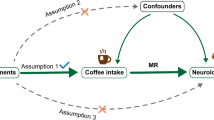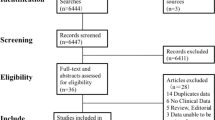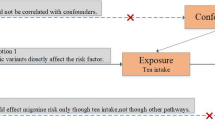Abstract
Objectives
Observational studies have shown associations between coffee and tea consumption and risk of intracranial aneurysm (IA). However, the results are not consistent. We conducted a Mendelian randomization study to clarify whether genetically predicted coffee and tea consumption has a causal effect on IA and its subtypes.
Methods
Genetic variants associated with coffee and tea consumption (cups/day) were obtained from large genome-wide association studies (GWASs), up to 349,376 subjects. Summary-level data for IA were adopted from a GWAS in 79,429 subjects (23 cohorts, 7495 cases, and 71,934 controls).
Results
Genetically predicted coffee consumption was associated with a higher risk of any IA and aneurysmal subarachnoid hemorrhage (SAH), but not with unruptured IA. The ORs per 1 cup/day increase in genetically predicted coffee consumption were 1.42 (95% CI: 1.09–1.86; P = 0.010) for IA, 1.51 (95% CI: 1.13–2.03; P = 0.005) for aneurysmal SAH, and 1.20 (95% CI: 0.74–1.96; P = 0.460) for unruptured IA. Genetically predicted tea consumption was not associated with risk of any IA and its subtypes (P > 0.05). The associations remained consistent in sensitivity analyses, and no evidence of pleiotropy was detected.
Conclusions
Our study provides evidence to support that coffee consumption may increase the risk of IA and associated hemorrhage. Coffee should be limited for those at high risk of IA and associated hemorrhage.
This is a preview of subscription content, access via your institution
Access options
Subscribe to this journal
Receive 12 print issues and online access
$259.00 per year
only $21.58 per issue
Buy this article
- Purchase on Springer Link
- Instant access to full article PDF
Prices may be subject to local taxes which are calculated during checkout



Similar content being viewed by others
Data availability
The data that supports the findings of this study are available in Supplementary Table 1.
References
Macdonald RL, Schweizer TA. Spontaneous subarachnoid haemorrhage. Lancet (London, England). 2017;389:655–66.
Vlak MHM, Rinkel GJE, Greebe P, van der Bom JG, Algra A. Trigger factors and their attributable risk for rupture of intracranial aneurysms: a case-crossover study. Stroke. 2011;42:1878–82.
Okamoto K, Horisawa R. The joint effect of oxidative stress and antioxidants on the risk of an aneurysmal rupture subarachnoid hemorrhage: a case-control study in Japan. Ann Epidemiol. 2007;17:359–63.
Okamoto K. Habitual green tea consumption and risk of an aneurysmal rupture subarachnoid hemorrhage: a case-control study in Nagoya, Japan. Eur J Epidemiol. 2006;21:367–71.
Burgess S, Bowden J, Fall T, Ingelsson E, Thompson SG. Sensitivity analyses for robust causal inference from mendelian randomization analyses with multiple genetic variants. Epidemiology. 2017;28:30–42.
Bakker MK, van der Spek RAA, van Rheenen W, Morel S, Bourcier R, Hostettler IC, et al. Genome-wide association study of intracranial aneurysms identifies 17 risk loci and genetic overlap with clinical risk factors. Nat Genet. 2020;52:1303–13.
Cornelis MC, Byrne EM, Esko T, Nalls MA, Ganna A, Paynter N, et al. Genome-wide meta-analysis identifies six novel loci associated with habitual coffee consumption. Mol Psychiatry. 2015;20:647–56.
Auton A, Brooks LD, Durbin RM, Garrison EP, Kang HM, Korbel JO, et al. A global reference for human genetic variation. Nature. 2015;526:68–74.
Wang M, Bai Y, Wang Z, Zhang Z, Liu D, Lian X. Higher tea consumption is associated with decreased risk of small vessel stroke. Clin Nutr. 2021;40:1430–35.
Bowden J, Davey Smith G, Burgess S. Mendelian randomization with invalid instruments: effect estimation and bias detection through Egger regression. Int J Epidemiol. 2015;44:512–25.
Yavorska OO, Burgess S. MendelianRandomization: an R package for performing Mendelian randomization analyses using summarized data. Int J Epidemiol. 2017;46:1734–39.
Verbanck M, Chen C-Y, Neale B, Do R. Detection of widespread horizontal pleiotropy in causal relationships inferred from Mendelian randomization between complex traits and diseases. Nat Genet. 2018;50:693–98.
Isaksen J, Egge A, Waterloo K, Romner B, Ingebrigtsen T. Risk factors for aneurysmal subarachnoid haemorrhage: the Tromsø study. J Neurol Neurosurg Psychiatry. 2002;73:185–87.
Noordzij M, Uiterwaal CS, Arends LR, Kok FJ, Grobbee DE, Geleijnse JM. Blood pressure response to chronic intake of coffee and caffeine: a meta-analysis of randomized controlled trials. J Hypertens. 2005;23:921–8.
Bonita R. Cigarette smoking, hypertension and the risk of subarachnoid hemorrhage: a population-based case-control study. Stroke. 1986;17:831–35.
Inci S, Spetzler RF. Intracranial aneurysms and arterial hypertension: a review and hypothesis. Surg Neurol. 2000;53:530–40.
Zhang Z, Wang M, Yuan S, Cai H, Zhu S-G, Liu X. Genetically predicted coffee consumption and risk of Alzheimer’s disease and stroke. J Alzheimer’s Dis. 2021;83:1815–23.
Acknowledgements
We thank the International Stroke Genetics Consortium (ISGC) Intracranial Aneurysm working group and UK Biobank. Summary information for intracranial aneurysms was obtained from the ISGC Cerebrovascular Disease Knowledge Portal.
Author information
Authors and Affiliations
Contributions
Z.Z. and X.L. designed the research, performed the statistical analysis, and drafted the paper. MW, SY, and SCL interpreted the data and made critical revisions of the paper.
Corresponding author
Ethics declarations
Competing interests
The authors declare no competing interests.
Ethical approval
Our analyses used publicly available genome-wide association study summary data. Each study included in this study had already obtained related ethical review board approvals, and all participants provided informed consent.
Additional information
Publisher’s note Springer Nature remains neutral with regard to jurisdictional claims in published maps and institutional affiliations.
Supplementary information
Rights and permissions
Springer Nature or its licensor (e.g. a society or other partner) holds exclusive rights to this article under a publishing agreement with the author(s) or other rightsholder(s); author self-archiving of the accepted manuscript version of this article is solely governed by the terms of such publishing agreement and applicable law.
About this article
Cite this article
Zhang, Z., Wang, M., Yuan, S. et al. Genetically predicted coffee and tea consumption and risk of intracranial aneurysm. Eur J Clin Nutr 77, 811–814 (2023). https://doi.org/10.1038/s41430-023-01295-7
Received:
Revised:
Accepted:
Published:
Issue Date:
DOI: https://doi.org/10.1038/s41430-023-01295-7



